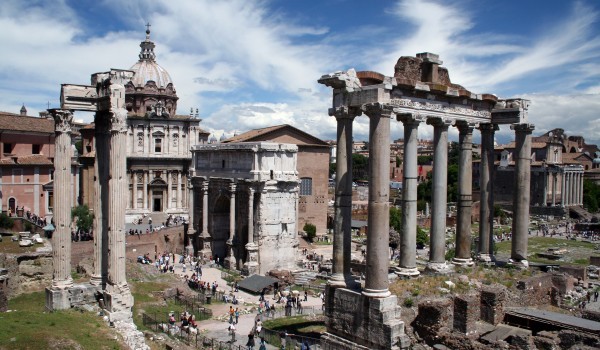In this election cycle, Donald Trump’s campaign slogan has been “Make America Great Again” – an implication which portrays an America that was great but is no longer. Countering that, Hillary Clinton has proclaimed that “America is Great”, meaning there has been no loss of America’s “greatness”.
So the question posed to voters in this upcoming election is, “Who’s vision of America is accurate?” The answer lies in the follow up question, “What do you mean by ‘greatness’?” To resolve this issue, all we need do is examine our present condition and ask if that condition fits how you would define “greatness.”
In approaching this matter I was drawn back to the Roman Empire, which by all accounts possessed “greatness.” What were some of the things that Rome was noted for that amounted to its “greatness”? There was the Pax Romana, paved stone roads that linked all parts of the empire together, a common language for government (Latin), emphasis on architectural achievements and engineering feats, literature and the advancement of the sciences, a strong army and navy, a high price placed upon citizenship and much more. In looking at our past, we could say that America also possessed these same qualities as well; the debate is whether or not we still do.
If you believe that a government should give you cradle-to-grave care at the expense of the whole of society, then you might think we are presently “great.” If you believe that leaders are exempt from the same judgment under the law that other citizens would be, then you might think we are presently “great.” If you believe that the government should set the educational standards and water them down so that all students “pass” whether or not they learn the material, then you might think we are presently “great.” If you believe we should not project a strong military presence on the world stage so that the other nations will “like” us better, then you might think we are presently “great.” If you believe we should not insist that those who come to our shores learn our historical tongue and assimilate into becoming “American”, but instead maintain the language of and allegiance to their mother country instead of America, you might think we are presently “great.” If you believe the loss of individual freedom and liberties to an ever-growing centralized government is a good pathway, then you might think we are presently “great.”
On the other hand, if you believe that we have ceased to be a land where all are equal under the law and that the powerful and influential should not be given special treatment, then you might think America needs to be made “great again.” If you believe that we have lost our competitive edge in science and technology and must import skilled and knowledgeable people from other countries because our educational system has become a dismal failure, then you might think America needs to be made “great again.” If you believe that the reduction of our military to a mere shadow of what it was when America was respected by its allies and feared by its enemies, then you might think America needs to be made “great again.” If you believe our open border and non-assimilation policies have destroyed what it means to “be American”, then you might think America needs to be made “great again.” And if you believe that our individual freedom and liberties are being stripped from us so that we can no longer live a life of self-determination, then you might think America needs to be made “great again.”
There’s many more of these “Jeff Foxworthy” type of questions we could play, but I think these sum up the two pictures well enough. I happen to believe America falls into that second category, and so the obvious follow up is, “Who made America great to begin with, and how do we get back to that position of greatness?” I’ll broach this topic in a follow up essay.
